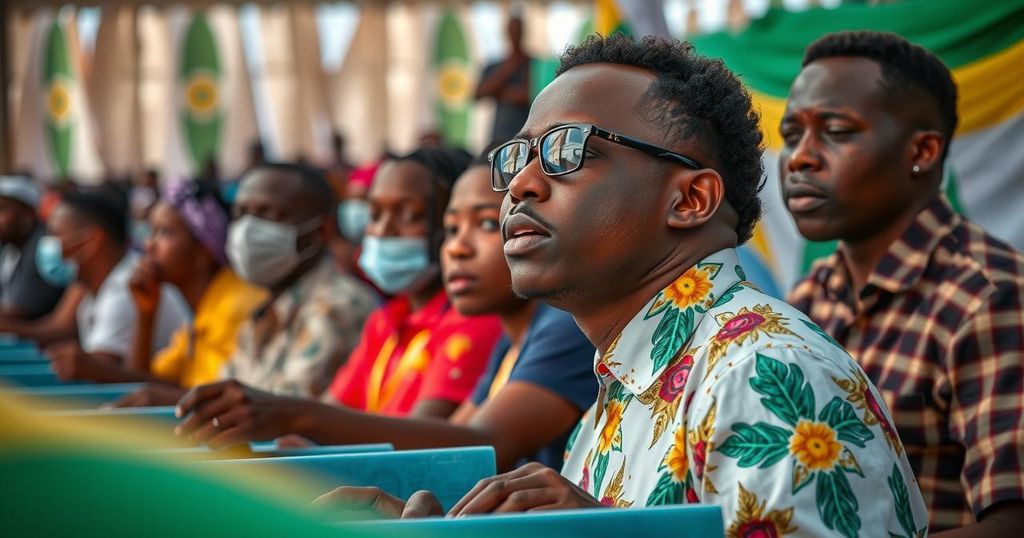World news
ACCRA, AFRICA, BEDIAKO, CHEDDAR, DEMOCRACY, ELECTORAL PROCESS, GHANA, GOVERNANCE, GOVERNMENT, JOHN TADEN, LOS ANGELES, MAHAMUDU BAWUMIA, NATIONAL DEMOCRATIC CONGRESS, NEW PATRIOTIC PARTY, NORTH AMERICA, NPP NDC, OPPOSITION, PEPPERDINE UNIVERSITY, POLITICS, UNITED STATES, UNIVERSITY OF GHANA, VOA
Fatima Alavi
0 Comments
Ghana’s December Elections Set for a Competitive Showdown Between Mahama and Bawumia
The upcoming elections in Ghana on December 7 feature former President John Mahama against Vice President Mahamudu Bawumia, with both candidates proposing different strategies for economic recovery. The election highlights voter dissatisfaction with traditional party politics amid critical economic issues, including rising inflation and illegal mining. As tensions rise, this contest is expected to be one of the most competitive in recent history, showcasing the electorate’s diverse aspirations.
As Ghana prepares for its national elections on December 7, the contest is shaping up to be highly competitive, primarily featuring former President John Mahama from the National Democratic Congress (NDC) against the incumbent Vice President Mahamudu Bawumia of the New Patriotic Party (NPP). Each candidate has presented distinct visions for the country’s recovery from a recent economic crisis, which included a substantial $30 billion external debt default in 2022. Mahama has promised to foster a 24-hour business environment aimed at job creation, while Bawumia is focused on economic revitalization in light of post-pandemic challenges.
Ghana’s political landscape has been dominated by the NDC and NPP since 1992, leaving little room for minor parties to make significant impacts. University of Ghana’s Kwame Asah Asante remarked on the predictability of election outcomes, stating that the primary competition will likely remain between these two established parties. However, some citizens express dissatisfaction with the existing political structure, desiring a shift to alternative parties for improved governance.
In the bustling capital of Accra, campaign advertisements for various candidates underscore the palpable excitement among voters, although many remain undecided. Concerns surrounding the economy are paramount, especially given the sharp rise in inflation, which reached a historic 54% over the past 18 months. Asante emphasized that economic issues will be paramount in influencing voter decisions, particularly in a country grappling with the ramifications of both internal and external pressures on its economy stemming from global events.
Additionally, illegal mining activities, locally termed “galamsay,” are wreaking havoc on the environment and agriculture, further complicating the electoral landscape. Voters such as Wisdom Gavor and Janet Bawah are vocal in their desire for change, expressing hope that Mahama’s vision for a 24-hour economy could enhance employment opportunities significantly.
Conversely, other voters commend the current administration’s digitization initiatives credited to Bawumia, which have purportedly improved efficiency within government operations and job accessibility, highlighting a divide in voter sentiment about the NPP’s policies.
While some polls indicate potential volatility in the electoral outcome, Ghana is broadly recognized as a stable democracy in a region otherwise affected by political instability. This year’s elections promise to be fiercely contested, reflecting the diverse opinions and needs of the Ghanaian populace.
Ghana’s upcoming elections on December 7 denote a critical juncture as both major political parties—NDC and NPP—vie for leadership amid economic recovery challenges. After defaulting on a $30 billion external debt in 2022, the nation has been struggling with inflation and environmental crises exacerbated by illegal mining activities. With a rich history of political rivalry between the two dominant parties and emerging concerns among the electorate, this election could define Ghana’s future economic and environmental landscape.
In conclusion, the December 7 elections in Ghana symbolize a pivotal moment for the nation’s political and economic future. With both leading candidates offering contrasting visions for economic recovery and governance, voter sentiment is deeply divided. The backdrop of rising inflation and environmental crises serves as a decisive context for this highly competitive election, shaping the priorities and choices of the electorate as they approach the polls.
Original Source: www.voanews.com




Post Comment